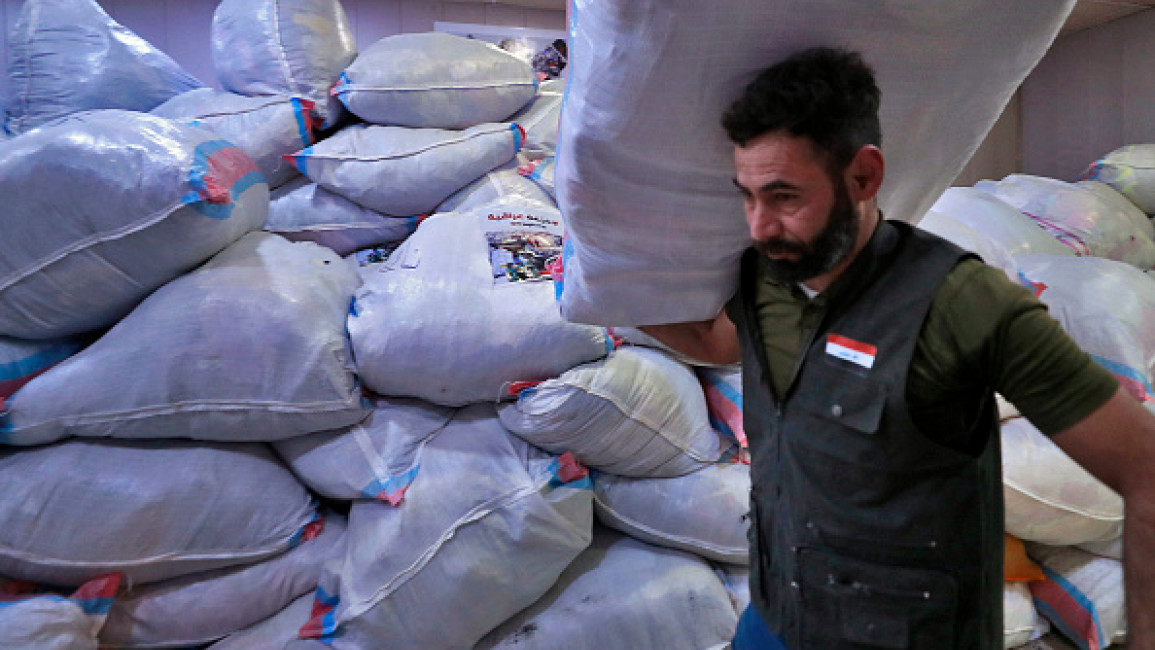Iran-backed Iraqi PMF militias using earthquake aid as front to expand in Syria
The devastating earthquake that hit southern Turkey and northern Syria in February has opened the door to Iran-backed Iraqi militias from the Popular Mobilisation Forces (PMF) - a coalition of mostly Shia-led armed groups who are allegedly using emergency aid and assistance as cover its expansionism in Syria.
PMF factions, such as Kataeb Hezbollah and Asaib Ahl Al-Haq, already had a presence in Syria before the earthquake, aiding the Syrian regime in their fight against rebels.
Most were positioned in the border regions between Syria and Iraq and the suburbs of Damascus, but their new presence in Aleppo is being justified under the pretext of humanitarian assistance.
While search and rescue operations are over, many of the militia fighters have not left Syria's largest city and have commandeered empty buildings across Aleppo which they claim are needed as distribution points for aid.
Reports suggest these campaigns were likely encouraged by religious leaders, with some critics saying they aim to whitewash Iraqi militias that fought in brutal regime offensives in Syria and were involved in serious human rights violations.
In recent days, video clips and photos appeared on media sites showing PMF Chief of Staff Abdul-Aziz Al-Mohammadawi ("Abu Fadak") next to Syrian President Bashar al-Assad, the two exchanging words.
It is understood that the deployment of the Iraqi factions to Aleppo was heavily funded by the Iran-backed PMF organisation as a whole.
Faleh al-Fayyad, who has been placed on the US sanctions list for human rights violations, is the current chairman of the movement.
PMF aid not subject to inspections
According to a statement by the PMF, 400 trucks loaded with fuel and various other aid materials entered Syria from Iraq via the Al-Qaim land crossing.
The convoy was accompanied by hundreds of PMF members driving SUVs as well as ambulances carrying medics. Most headed for Aleppo and its suburbs, one of the hardest hit cities by the earthquake. Abu Fadak and Qassem Musleh, two leading figures from the PMF, supervised the convoy.
Al-Araby Al-Jadeed, The New Arab's Arabic-language sister edition, spoke to two PMF sources who said "hundreds" of trucks had entered Syria and that some of the aid - such as food and bedding - had gone to the Syrian regime due to it lacking these resources. There have been reports of UN and other aid being sold on the black market in regime-held areas.
They said no official visas were required for the militia fighters and PMF trucks were not subject to the usual inspections or passport checks by Syrian border guards.
One of the sources said: "Some Iraqi factions, like Nujaba and Kataeb Hezbollah, are still in Syria and are carrying out security tasks in some areas, specifically in Sayyida Zaynab [a Damascus neighbourhood hosting an important Shia shrine]."
PMF leader Mohammed Al-Basri said: "PMF leaders hurried to support the Syrian people, especially those affected by the earthquake that destroyed their homes, and the Iraqi government also sent donations to Turkey and affected families there, and other Arab countries also took part in this humanitarian campaign."
Israeli troops launched a fresh raid in the occupied West Bank city of Jenin, which resulted in the death of six Palestinians and 11 others being wounded, including a girl.
— The New Arab (@The_NewArab) March 7, 2023
🎥: @Reemkhabbazy pic.twitter.com/X1Litruyh1
"Why this scepticism about the PMF efforts, and why all these accusations against the PMF? Is it because they represent a religious-based security system, or is it that there are international forces who don't want PMF to be present in the affected areas?" he asked.
He said the PMF isn't transporting weapons to Syria, only food and mattresses, and that Abu Fadak's presence in Aleppo is to reassure Syrians, not to threaten them.
"The PMF is always being smeared in the media, and we have got used to this type of discourse, however in truth is that the PMF hasn't taken one step in Syria to support the affected areas without securing agreement from the Iraqi government first," he said.
Ahmad Al-Abyad, a political analyst and founder of the Iraqi National Opposition Front, believes Iran-backed armed factions will exploit the earthquake to deepen their presence in Syria.
"The timing of the earthquake has given them and Iran an opportunity to take control of Aleppo because Tehran wants to take joint control of its resources with Damascus, as it's the economic capital of Syria," he said.
"The armed factions want to whitewash their image with the Syrians, which has been distorted by their violations during the period when fighting was intensifying between armed groups in Syria. Likewise, it is also pushing the idea that the PMF is a security and service agency that contributes to helping humanitarian causes."
He said that some of the leaders of the PMF factions are accused of crimes against humanity, the embezzlement of public funds, violations of international laws and procedures, and supporting the brutal Assad regime.
"[There are] shared economic interests between the armed factions and the Assad regime, in the areas of construction, urbanisation, economic companies, and the energy and arms sectors, and there are reports on the possibility that the armed factions are transporting arms to Syria via the aid trucks," he claimed.
The 6 February earthquake killed at least 50,000 people in Syria and Turkey, flattening whole sections of towns and cities.
More than 10,000 Syrians died in the earthquake including 1,414 in regime-held areas, over 4,500 in opposition areas, and at least 4,267 Syrian refugees living in Turkey.
This is an edited translation from our Arabic edition. To read the original article click here.



